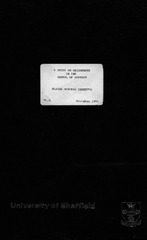| dc.contributor.author | Charette, Blaine | en |
| dc.date.accessioned | 2020-12-23T00:05:15Z | |
| dc.date.available | 2020-12-23T00:05:15Z | |
| dc.date.issued | 1991-11 | en |
| dc.identifier.uri | archives.northwestu.edu/handle/nu/55296 | |
| dc.description | A thesis submitted for the degree of Doctor of Philosophy to the Department of Biblical Studies, University of Sheffield. | en |
| dc.description | Original item retained by donor. | en |
| dc.description.abstract | It is argued in this thesis that the theme of recompense in Matthew is best understood when it is seen against the backdrop of the recompense schema which inheres in the Sinai covenant.
In chapter 1 an Old Testament system of recompense is identified and described which might have provided the background against which Matthew developed his own teaching . A convincing schema is that which is centred on the land. The land promised to Abraham became, in effect, the reward for his descendants. Conversely, the loss of the land became the ultimate punishment. In the Sinai covenant the essential requirements for entrance and success in the land are set forth and the people are presented with the choice of blessing or curse. In choosing the latter the nation was uprooted from its land and cast into the darkness of exile. Even so, the story of God’s dealings with his people had not ended. ,The promises made to Abraham and David ensured that a remnant would be restored to the land.
In chapter 2 Matthew’s continuation of this story with respect to the reward of the faithful is examined. He presents Jesus, the son of Abraham and David, as the one in whom the promises find their fulfilment. A new covenant centred in Jesus is established and, as a consequence, the salvation inaugurated in him provides the eschatological restoration to land and kingdom. Yet, obedience is also essential to this covenant. Gnly those who confess Jesus and fulfil his demands constitute the remnant which is restored.
In chapter 3 Matthew’s warning to the church, in the light of Israel’s fate, is examined. Its members also have entered into a covenant relationship and must take seriously the attendant demands and obligations. The disobedient will experience the curse of God. They are to be cut off for ever from the reward and blessing of God with no hope of return.
Finally, certain implications of the study are noted. | en |
| dc.description.tableofcontents | "I set before you a blessing and a curse" : the Old Testament covenantal background to the Matthean teaching on recompense -- "Those Yahweh blesses shall inherit the land" : the teaching on reward in the gospel of Matthew -- "But those he curses shall be cut off" : the teaching on punishment in the gospel of Matthew. | en |
| dc.format.extent | 176 pages | en |
| dc.format.medium | Paper | en |
| dc.language.iso | en | en |
| dc.publisher | University of Sheffield | en |
| dc.rights | This original work is protected by copyright. Copyright is retained by the author(s). Works may be viewed, downloaded, or printed, but not reproduced or distributed without author(s) permission. | en |
| dc.rights.uri | http://archives.northwestu.edu/page/copyright | en |
| dc.title | A Study on Recompense in the Gospel of Matthew | en |
| thesis.degree.name | Doctor of Philosophy | en |
| thesis.degree.level | Doctoral | en |
| thesis.degree.grantor | University of Sheffield | en |
| thesis.degree.discipline | Department of Biblical Studies | en |


 Maintained by the Northwest University Library
Maintained by the Northwest University Library